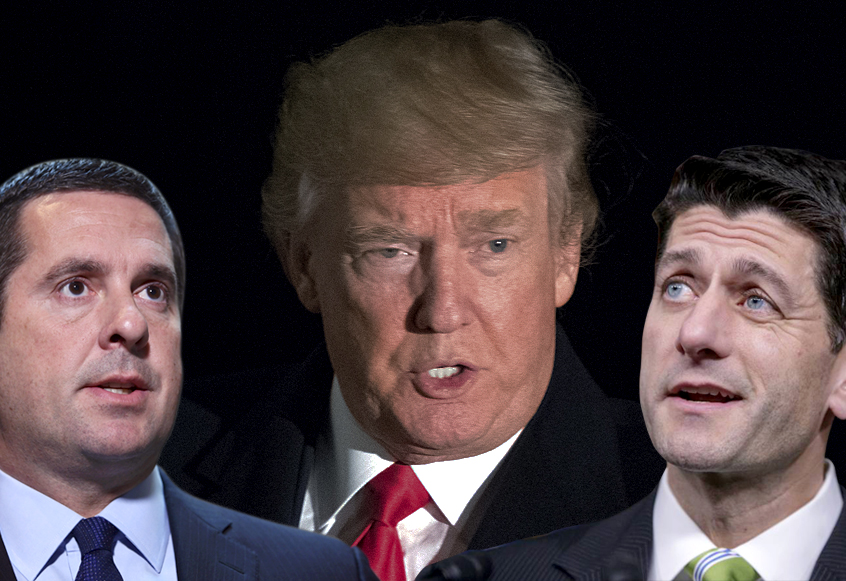Friday’s release of the controversial Republican memorandum discussing the early stages of the federal investigation into connections between Russia and the 2016 presidential campaign of Donald Trump stirred up a media fuss but the Republican members of the House Intelligence Committee seem only to have invited more questions about their document than they answered.
Congressional Democrats pushed back vigorously against the memo’s conclusions that the FBI had relied heavily on information compiled by former British spy Christopher Steele in seeking court authorization to monitor the communications of former Trump aide Carter Page. They also accused House Intelligence Committee Chairman Rep. Devin Nunes, R-Calif., of instructing his staff to deliberately omit key information that ran counter to his conclusions when writing the document.
“Unlike almost every House member who voted in favor of this memo’s release, I have actually read the underlying documents on which the memo was based. They simply do not support its conclusions,” said Virginia Democratic Sen. Mark Warner, the vice chairman of the Senate Intelligence Committee.
In a call with reporters, Rep. Adam Schiff, Nunes’ Democratic counterpart on the House Intelligence Committee and a fellow Californian, accused Nunes of utilizing “cherry-picked information” from classified testimony delivered by former FBI Deputy Director Andrew McCabe about how heavily the agency had relied upon the Steele dossier. According to Schiff, McCabe had said that the investigation would have started and continued independently of Steele’s allegations.
The Nunes document admits that the FBI had utilized other information sources in its first October 2016 request to spy on Page but claims that when it later applied for a court renewal of its surveillance, it referenced Steele’s research without fully disclosing that it had been paid for by the Democratic National Committee.
Page came to the attention of U.S. intelligence agencies after he made several contacts with individuals believed to be agents of the Russian government. In July of 2016, he traveled to the country and gave a strongly pro-Putin speech. Initially, some former Trump associates claimed to have not known of his trip but after Page testified before the House Intelligence Committee, they acknowledged he had informed them of the trip. The New York Times reported that in 2013, Russian operatives had tried to develop Page, a former energy investment fund operator, into an intelligence asset. According to the Times, they eventually abandoned their efforts, allegedly calling Page an “idiot.”
Arizona Republican Sen. John McCain, chair of the chamber’s Armed Services Committee, expressed anger at unspecified “partisan attacks on the FBI and DOJ” which he said improperly undermined confidence in the Russia investigation of special counsel Robert Mueller.
“The latest attacks on the FBI and Department of Justice serve no American interests – no party’s, no president’s, only Putin’s,” he said in a statement. “The American people deserve to know all of the facts surrounding Russia’s ongoing efforts to subvert our democracy, which is why Special Counsel Mueller’s investigation must proceed unimpeded. Our nation’s elected officials, including the president, must stop looking at this investigation through the warped lens of politics and manufacturing partisan sideshows. If we continue to undermine our own rule of law, we are doing Putin’s job for him.”
Christopher Anders, a lobbyist with the American Civil Liberties Union, said that the allegation that federal investigators withheld relevant information about the funding and motivation of Steele’s investigation were “serious charges” but he did not believe that Nunes memo included enough information to substantiate the allegations.
“Rather than one side or the other cherry-picking facts, all Americans deserve to see all of the facts, including both the minority report and the underlying documents,” he said.
Speaker of the House Paul Ryan, R-Wisc., commended the release of the Nunes memo but called for the de-classification of the Democratic response.
“I am glad that this memo helps to provide greater transparency, and I reiterate my support for the similar release of the minority’s memo once it is properly scrubbed of all intelligence sources and methods,” he said.
Many members of Ryan’s caucus have been promoting the GOP intelligence committee memo for weeks, claiming it would lead to many firings. Several right-wing media outlets have extended those criticisms much further, even to the point of claiming that law enforcement officials and Trump’s political opponents are guilty of “treason” and deserve the death penalty.

